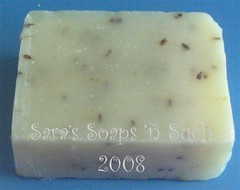| Anise soap (Photo credit: Sara's Soaps) |
I love getting questions from customers, because it gives me the opportunity to educate the customer in some way. I received this question from a customer over the weekend:
When you say that the product is one hundred percent natural, does that mean that it has no dye, chemicals or harmful ingredients and is safe for your skin?This was a great question, but by no means easy to answer with a simple "yes" or "no." Here's what I told her:
As far as skin-safe... All of my products are skin-safe. Not all of them are 100% natural, but I'll identify those which are and are not so it's hopefully clear to my customers. My goal is to go all natural whenever possible and as gentle as possible. I strive to make products that suit all skin types and preferences. We here use my products on a regular basis, including my two children, so whatever I make must suit their skin first.
One hundred percent natural can have colorants, but I don't use dyes in these soaps. Sometimes I don't use any colorants at all, though the essential oils may impart a tint to the finished soap.
If you consider an ingredient harmful if, in its raw form, it can cause harm, then, yes, my soaps contain a harmful ingredient. One of the three main components in soap is sodium hydroxide (lye), which is a very strong caustic agent and extremely harmful in raw form. However, it is what reacts to the oils in soapmaking, working with the oils to create soap. I formulate my soaps to have leftover fats (the term is "superfatting" or "lye reduction"). This means that I alter the oil/lye ratio so that the lye cannot possibly saponify (make into soap) all the oils. This makes soap more moisturizing. I also like using milks in some of my soaps, especially goat milk and coconut milk, which also makes the finished soap more skin nourishing. Finished soap contains saponified oils with no active lye.
The dictionary defines "chemical" as "a substance obtained by a chemical process or producing a chemical effect." Going by that definition, all my ingredients and products are chemicals. Lye dissolves in water, then the lye mixture reacts with the oils in all sorts of cool ways. The raw soap changes color, opacity and viscosity. Then as the saponification really gets underway, the raw soap gets very hot through an exothermic (literally, heat sending) reaction. The end result is soap and glycerin. Essential oils are often the result of chemical processes. Soapmaking and cosmetic manufacturing is pretty much all about chemical reactions. In some products, I use manmade chemicals, such as preservatives (vital in water-based cosmetics) and fragrance oils, which are a blend of essential oils and synthetic components. Occasionally, I'll use other manmade ingredients in certain products, but not without a specific purpose. If there is a natural alternative or if the ingredient in question won't add anything significant to the end product, then I'd just as soon leave it out.Got a question? Feel free to shoot me an email or post it in the comments.




No comments:
Post a Comment